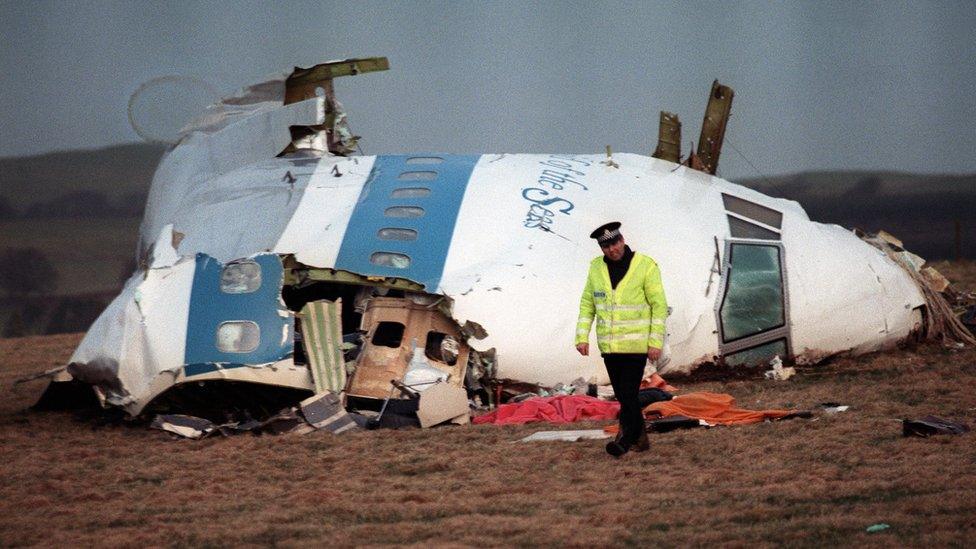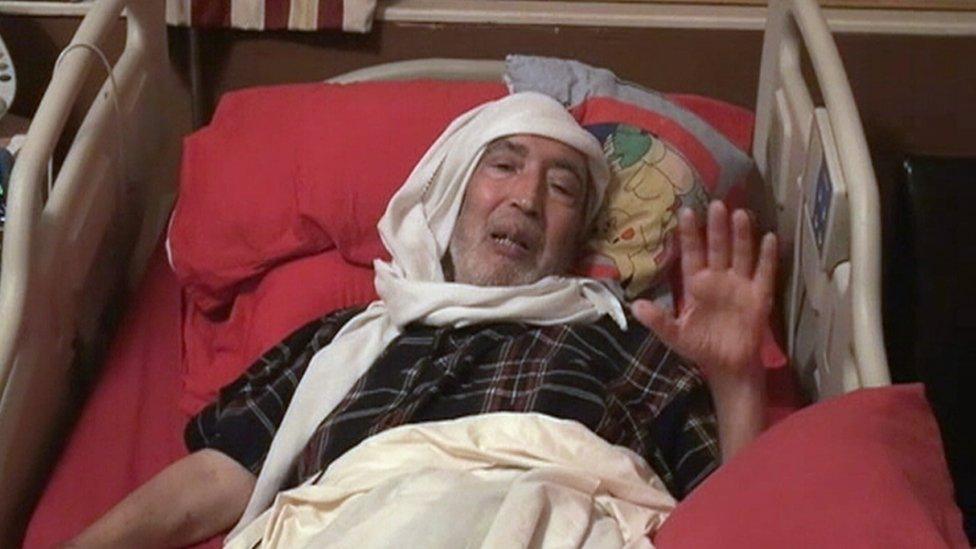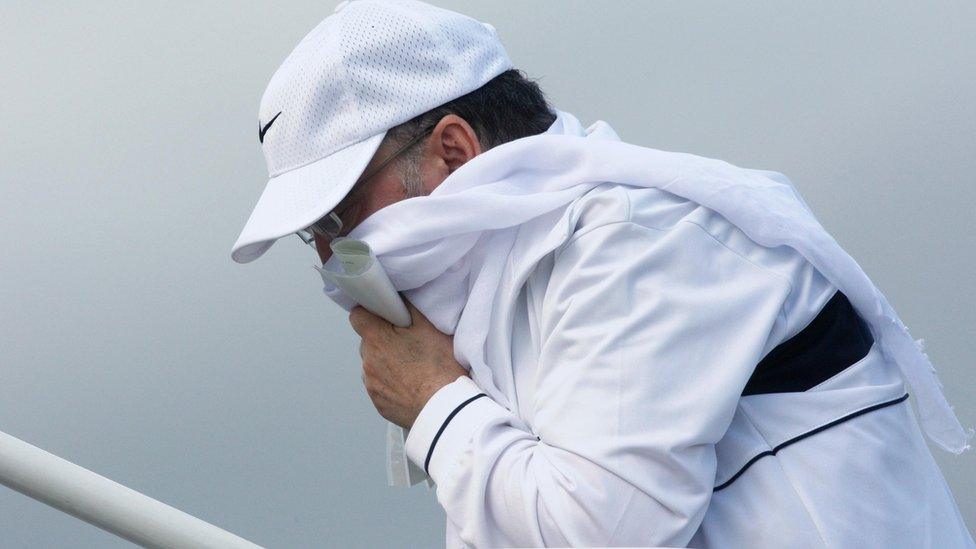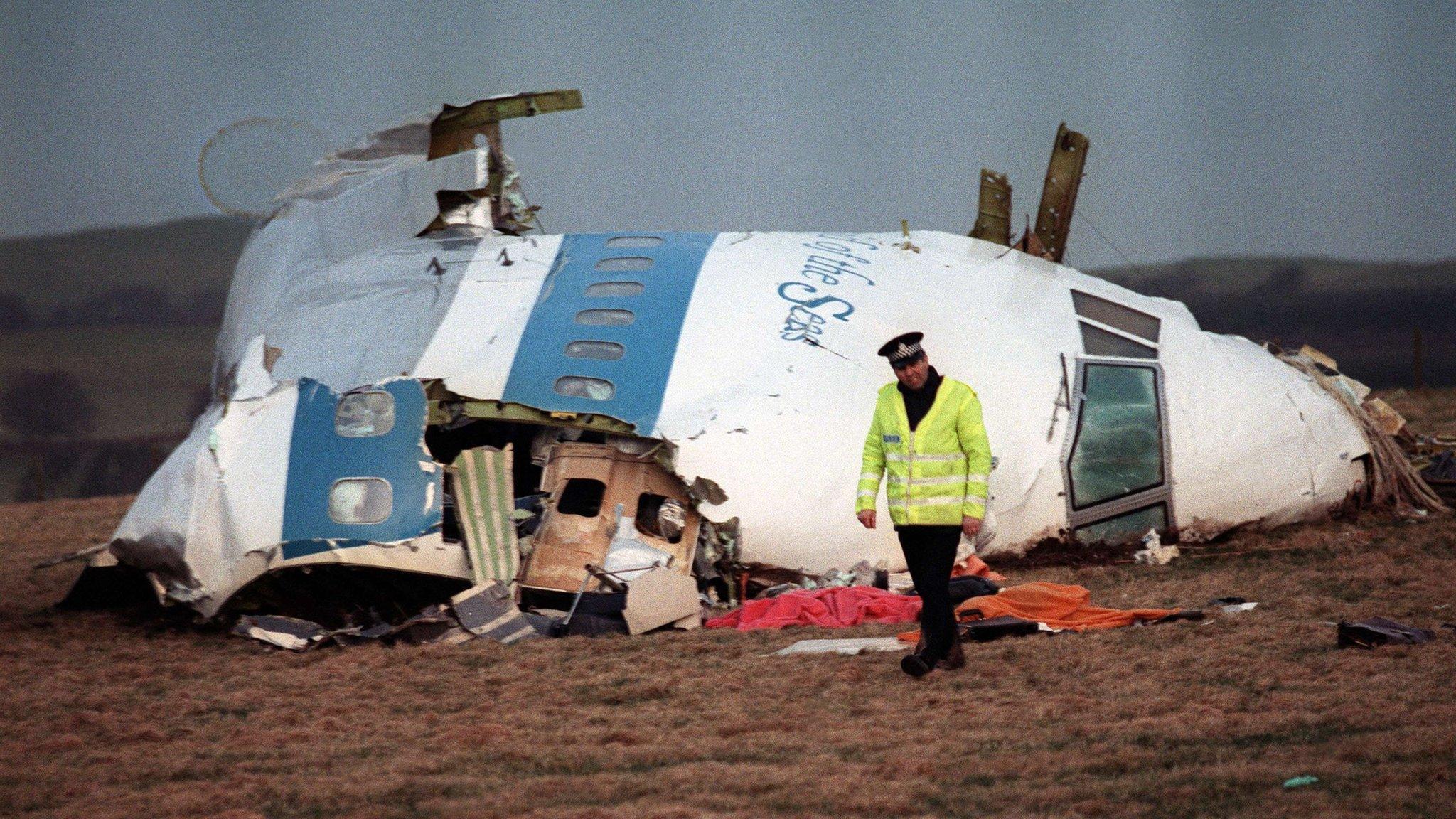Lockerbie bombing: New suspect soon to be charged - US media
- Published

A total of 270 people died in the Lockerbie bombing on 21 December 1988
The US will soon announce charges against a Libyan suspected of making the bomb that blew up Pan Am Flight 103 over Lockerbie in 1988, US media say.
Prosecutors will soon seek the extradition of Abu Agila Mohammad Masud to stand trial in the US, reports say.
He is currently being held in Libya, according to the Wall Street Journal. This has not been confirmed by the Libyan authorities.
The blast on board a Boeing 747 over the Scottish town left 270 people dead.
Most of the victims on board the flight from London to New York were American citizens. Eleven people on the ground were also killed.
It remains the deadliest terrorist incident ever to have taken place on British soil.
Libyan national Abdelbaset al-Megrahi was the only man convicted, in 2001, over the bombing.
Megrahi, who always proclaimed his innocence, launched two appeals against his 27-year sentence, one was unsuccessful and the other was abandoned.
Megrahi was released from prison in Scotland and allowed to return to Libya on compassionate grounds in 2009 after it emerged that he had terminal cancer. He died three years later.
A Scottish court is now considering a posthumous appeal against his conviction by his family.
The BBC's Mike Wooldridge reports on the life of Abdelbaset Ali al-Megrahi
What are US media reporting?
The US Department of Justice is expected to unseal a criminal complaint against Abu Agila Mohammad Masud in the coming days, the Wall Street Journal reports, quoting senior department officials.
It says this will open a new chapter in one of the world's longest and most sprawling terrorism investigations.
The new charges are expected to be announced by outgoing US attorney-general, William Barr.
He held the same position when the US announced its first charges against Megrahi and another Libyan suspect, later acquitted, in 1991.
"We will not rest until all those responsible are brought to justice. We have no higher priority," Mr Barr said at the time.
The Wall Street Journal reports that Mr Masud is being held in Libya, although the New York Times says his exact whereabouts are unknown. But it adds that he was jailed in Libya at one point for unrelated crimes.
Mr Masud is alleged to have been a top bomb-maker for late Libyan leader Muammar Gaddafi.
Neither the US justice department nor the Libyan authorities have commented on the issue.
Journalist Ken Dornstein, whose brother David was on board the Pan Am plane, went to Libya to track down Mr Masud as part of a 2015 TV documentary by US network PBS called My Brother's Bomber.
Ken Dornstein on how he tracked down new Lockerbie suspects
He told the BBC at the time that the Libyan national was "a mystery figure" who was named in the initial investigation and "was said to have been a technical expert".
The documentary alleged that Mr Masud had also been linked to a bombing at a disco in West Berlin in 1986, which killed three people. It also reported that he was imprisoned in Libya over his role in the 2011 uprising that ousted Gaddafi.

Could this finally lay the case to rest?
Paul Adams, BBC Diplomatic Correspondent
The images from Lockerbie were searing.
The jumbo jet's shattered nose, resting on its side in a Scottish field.
The disaster became known, simply, as Lockerbie - by far the worst act of terrorism the UK had ever seen.
It spawned any number of theories about who was responsible, with fingers pointing, at one time or another, at Iran, Syria, Palestinian militants and, finally, Libya.
The most persistent of those theories is that Iran was bent on revenge after one of its civilian airliners, Iran Air 655, was brought down over the Persian Gulf by a surface-to-air missile, fired in error by an American warship just five months earlier.
Iran, it was said, employed the services of bomb-makers from the Palestinian militant group, the PFLP-GC.
British officials have never believed this version of events and remain convinced Lockerbie was the work of Libyan agents, working under orders from the country's former dictator, Muammar Gaddafi.
News that the US authorities are on the verge of unveiling charges against a second Libyan, someone whose name was mentioned in the original investigation, would seem to bolster this belief.
It could, finally, lay other theories to rest.
If the US case against Mr Masud is based on a confession made to Libyan interrogators in 2012 and handed over to the Scottish authorities in 2017, as reported by the Wall Street Journal, then it could also affect legal proceedings in Scotland.
A third, posthumous appeal against Abdelbaset al-Megrahi's 2001 conviction began at the High Court in Edinburgh last month.

Lockerbie bombing - timeline
US and British investigators indicted Megrahi in 1991 but he was not handed over by the Libyans until April 1999.
May 2000 - A special trial under Scots law starts on neutral ground at Camp Zeist in the Netherlands.
31 January 2001 - Former Libyan intelligence officer Megrahi is found guilty of mass murder and jailed for life with a minimum term of 27 years.
March 2002 - Megrahi loses an appeal against his conviction.
September 2003 - The Scottish Criminal Cases Review Commission (SCCRC) is asked to investigate Megrahi's conviction.
June 2007 - The SCCRC recommends that Megrahi is granted a second appeal against his conviction.
18 August 2009 - Megrahi's move to drop his second appeal is accepted by judges at The High Court in Edinburgh.
20 August 2009 - Megrahi, who has terminal prostate cancer, is released from prison on compassionate grounds, external.
May 2012 - Megrahi dies at his home in Tripoli, aged 60.
July 2015 - Scottish judges rule that relatives of the Lockerbie bombing victims should not be allowed to pursue an appeal on Megrahi's behalf. Courts had previously ruled that only next of kin could proceed with a posthumous application.
July 2017 - Megrahi's family launched a new bid to appeal against his conviction.
March 2020 - The Scottish Criminal Case Review Commission said Megrahi's conviction can be taken to a fresh appeal.
November 2020 - Five Scottish judges hear the third appeal against Megrahi's conviction on grounds of possible miscarriage of justice

Related topics
- Published3 May 2018

- Published4 July 2017

- Published12 December 2022
